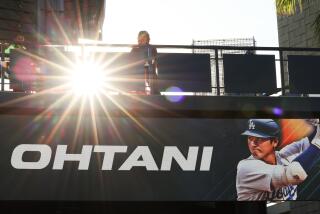Player Loyalty
- Share via
Suppose that one morning America woke up and found Michael Jordan pitching Adidas, Grant Hill wearing Nikes and Shaquille O’Neal strapping on a pair of Fila shoes.
Sports marketing earthquakes of that magnitude aren’t likely to occur, experts agree. Not even in an era when slugger Mark McGwire changes uniforms while chasing Babe Ruth’s ghost and pro sports fans fret about franchises slipping away during the night.
So don’t look for Arnold Palmer to sign up with Quaker State after 19 years with Pennzoil. And racing fans will be stunned if driver Jackie Stewart unexpectedly shifts gears from longtime partner Ford to Chevrolet.
That doesn’t mean it can’t be done.
“There’s nothing endemic in an endorsement contract that prevents movement,” said Lon Babby, a Washington attorney who advised NBA star Hill in his recent $80-million endorsement deal with Fila Holding. “In the vernacular of sports, you would be a free agent.”
But there are solid reasons why players do stick with their corporate partners.
Fans may view switches with cynicism, figuring that stars are latching on to a new product simply to grab a bigger bag of money. Corporate sponsors may not forgive an athlete who jumps ship to pitch a competing product, making it harder to secure future deals.
And, in the case of Hill, loyalty has its rewards.
His new deal with Fila includes a string of royalty options that could push the total value beyond $80 million over seven years.
Hill, whose relationship with Fila dates back to 1995, a year after he graduated from Duke University, also has an equity position in Fila and takes an active role in determining how his image is used. The Detroit Pistons forward also has endorsement agreements with McDonald’s and Coca-Cola.
“Grant recognizes that continuity benefits both sides,” Babby said. “And continuity is important because Grant views these as more business relationships than simply endorsements.”
A few well-known names have jumped ship to sign with a direct competitor of their former business partner and not suffered for it.
Michael Jordan, the endorsement king, walked away from Coke to embrace Gatorade, and NBA star Chris Webber recently signed with Fila after complaining that former partner Nike was targeting economically depressed families with its high-priced lines.
But celebrities who structure new deals risk “what you might call the ‘carpetbagger’ syndrome,” said Roy Adler, a marketing professor at Pepperdine University in Malibu. “You’re going to argue you switched to a superior product. But everyone is going to say, ‘Right, you went for a bigger bag of money.’ ”
A switch can backfire on the new sponsor as well. There’s the real possibility that consumers won’t notice that celebrity pitchmen are flogging a new product.
When Anheuser-Busch lured some sports figures away from Miller, “people really had to listen closely to the new ads,” Adler said. “The fact that it was a different brewery flew right past most people. They just thought it was another Miller Lite commercial.”
Endorsement contracts can be structured to ensure that the pitchers stay put. Babby said Hill’s deal doesn’t include a non-compete clause but that any such language would push up the value of an endorsement contract.
“That is going to be factored in,” Babby said, “because you’re talking about tying up a significant portion of a pro athlete’s playing career.”
Fans grudgingly accept baseball player Albert Belle thumbing his nose at the Cleveland Indians in order to win a fatter contract with the Chicago White Sox. And at a time when stadium sky boxes seem more important than star players, they recognize that pro sports franchises are as likely to be traded as baseball cards.
But marketing experts say that the wave of change washing through the sports industry hasn’t eroded the attraction of star players like Hill, who might one day auction his considerable basketball talents to the highest bidder and leave Detroit’s Pistons behind.
“If he gets more sun in Miami or less sun in Detroit, that isn’t an issue,” said Peter Arnell, chairman of Arnell Group Brand Consulting, the New York-based ad agency that is shooting Hill’s new Fila commercials this week in Los Angeles.
“The same reasons that make lots of [NBA] teams want him are the same reasons that Fila wants Grant,” Arnell said. “This is about a linkage between a talent and a brand. Grant is Grant, and as long as he stays Grant, the team [affiliation] doesn’t matter.”
(BEGIN TEXT OF INFOBOX / INFOGRAPHIC)
The 10 Most Wanted
Big-name athletes are scoring off the field as well as on. Here are the top 10 endorsers and their 1997 endorsement incomes:
Athlete and Endorsement income in millions:
1. Michael Jordon: $40.0
2. Tiger Woods: $25.0
3. Shaquille O’Neal: $23.0
4. Arnold Palmer: $19.2
5. Andre Agassi: $17.0
6. Jack Nicklaus: $16.0
7. Grant Hill: $15.5 (Does not include Hill’s recent deal with Fila Holdings)
8. Joe Montana: $12.0
9. Ken Griffey Jr.: $6.0
10. Deion Sanders: $6.0
* Sources: Sports Marketing Letter; Bloomberg News
More to Read
Go beyond the scoreboard
Get the latest on L.A.'s teams in the daily Sports Report newsletter.
You may occasionally receive promotional content from the Los Angeles Times.










